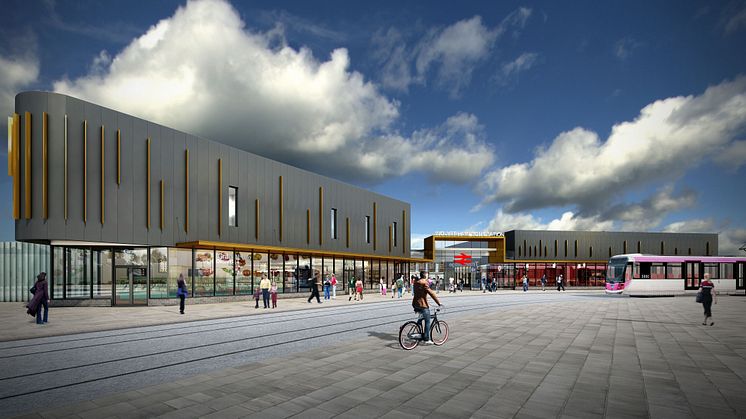
Press release -
New cycle parking arrangements at Wolverhamton railway station
Cycle parking arrangements at Wolverhampton Railway Station are changing in preparation for works to start on delivering a new station building.
The new-look station will be designed to better connect to all modes of transport as part of a £150 million Interchange.
This includes long-term plans to increase cycle parking provision at the station to encourage more cycling.
The station works will take place in two phases, during which time cycle parking spaces on platform 1 and the current station forecourt will be out of use.
A temporary solution will provide 40 spaces in front of the multi-storey car park, which is already covered by cctv. Existing shelters at the station will also be relocated to provide 30 spaces. The new temporary spaces will be available for use from the week commencing July 2.
Rail services will continue to operate as normal throughout the redevelopment of the railway station, which is expected to be completed in 2020.
Councillor John Reynolds, City of Wolverhampton, Cabinet Member for City Economy, said: “The cycle parking changes are essential to enable the demolition process to begin.
“The aim is to deliver a railway station befitting of the city that better connects rail, bus, tram and cycle users.
“There is £3.7 billion of investment currently on site or in the pipeline across the City of Wolverhampton.
“As part of this regeneration it is crucial visitors to our city get the best first impression possible and their travel experience is enhanced - the new state-of-the-art station will deliver that.”
Richard Brooks, customer experience director at West Midlands Railway, said: “The works at Wolverhampton will make connections with other forms of transport easier and make the station much more welcoming to visitors to our region. As the rail operator for the West Midlands we are committed to improving the links between the railway and different modes of transport.
“The ongoing works at the station are a necessary step in creating a flagship transport interchange hub, which will make travel easier and more accessible than ever before for passengers in Wolverhampton.”
The first phase of full demolition will start this summer.
The British Transport Police building and a small section of the current station building next to Platform 1 will be demolished, paving the way for the first section of the new station building to be erected. It will become operational to customers by summer 2019, when phase 2 of the programme will also start.
The new station will be connected directly to a tram stop, once work is completed on the Midland Metro city centre extension. The Midland Metro Alliance are currently delivering the next phase on Pipers Row before continuing down Railway Drive to the railway station.
ENDS
Editors notes:
1/ The £150 million Interchange project includes the already-operational bus station, Midland Metro city centre extension, refurbished and extended railway station multi-storey car park, and demolition of the current railway station building, with a new one to be built adjacent to it.
2/ Wolverhampton Interchange Partnership consists of City of Wolverhampton Council (CWC), Ion, West Midlands Combined Authority (WMCA), West Midlands Trains, Virgin Trains, Network Rail, Midland Metro Alliance, Canal & River Trust, and Black Country LEP.
3/ Galliford Try is one of the UK’s leading construction groups, responsible regionally for major projects such as the Royal Birmingham Conservatoire. In the West Midlands, they have also built the Birmingham Dental Hospital, Resorts World at the NEC, and Hotel La Tour.
Topics
Regions
Notes to editors
For further information on West Midlands Trains, London Northwestern Railway or West Midlands Railway call our newsroom on 03300 955150.
About West Midlands Trains
West Midlands Trains Ltd. will be running the West Midlands rail franchise from 10 December 2017 until 2025/6. Abellio has a 70.1% share of the company, East Japan Railway Company (JRE) and Mitsui & Co., Ltd. (Mitsui) own the remaining 29.9% in a 50:50 split.
About Abellio
Abellio is the international passenger transport subsidiary of the Dutch national railway company, Nederlandse Spoorwegen. Every day our people provide rail, bus and tram services to 1.7m customers across the UK, Germany and in the Netherlands. In the UK we operate buses through Abellio London, as well as ScotRail and Greater Anglia train services, and Merseyrail in a joint venture with Serco. In Germany we operate Abellio Deutschland, serving communities in North Rhine Westfalia, Saxony, Lower Saxony, Saxony-Anhalt, Hesse and Thuringia. Our role in transport extends beyond the journey from a-to-b. With our international heritage and our policy of sharing best practice, not just amongst ourselves, but across the wider transport industry, we provide thought leadership and truly innovative ideas which make a positive contribution to the communities we serve. For more information on Abellio visit www.abellio.com
About Mitsui
Mitsui is one of the most diversified and comprehensive trading, investment and service enterprises in the world with 139 offices in 66 countries as of March, 2017. Utilising our global operating locations, network and information resources, we are multilaterally pursuing business that ranges from product sales, worldwide logistics and financing, through to the development of major international infrastructure and other projects in the following fields: Iron & Steel Products, Mineral & Metal Resources, Infrastructure Projects, Integrated Transportation Systems, Chemicals, Energy, Food Resources, Food Products & Services, Consumer Services, IT & Communication, and Corporate Development Business. Mitsui is actively taking on challenges for global business innovation around the world. For more information, visit www.mitsui.com.
About JR East
East Japan Railway Company (JR East) was established in 1987, when Japanese National Railways was divided as part of a package of railway reforms. JR East’s railway business covers a 7,500 km (approx. 4,660 miles) network in the eastern part of the Japanese main island, including Tokyo Metropolitan area, and provides transportation services, comprising urban, suburban and high speed operations, for 17 million passengers on a daily basis. JR East also undertakes non‐transport commercial activities, which account for more than 30% of the total revenue of JR East Group. JR East contributes to passengers and communities it serves by delivering high degrees of punctuality, reliability and comfort and also continues to pursue higher levels of safety and service quality through technical innovation. For more information, visit www.jreast.co.jp/e.

